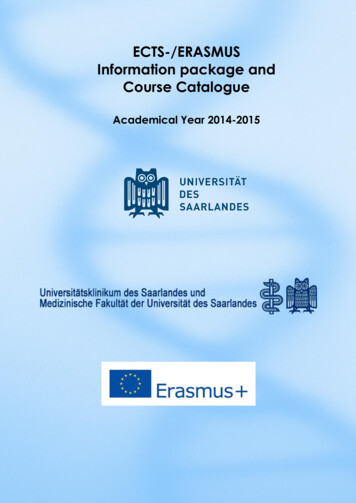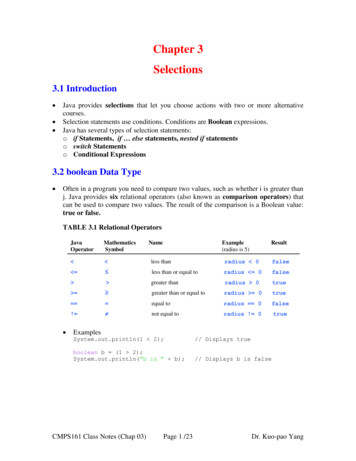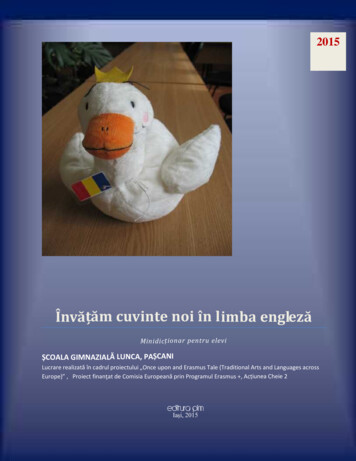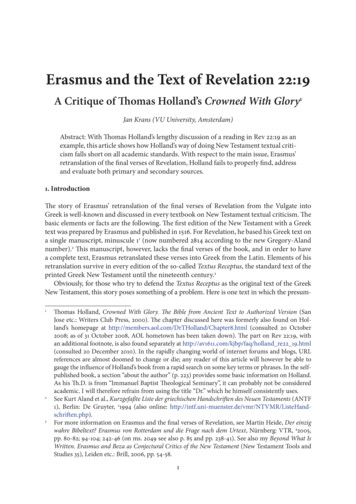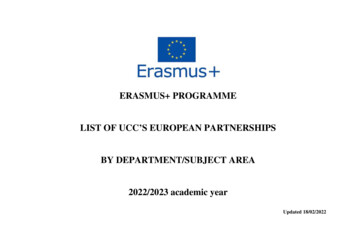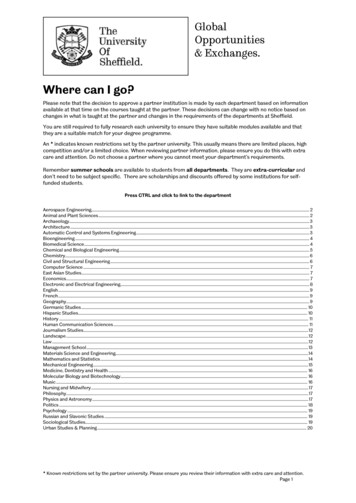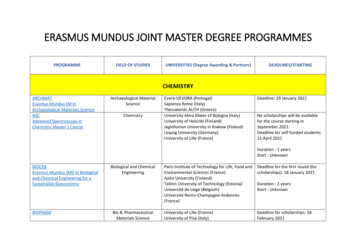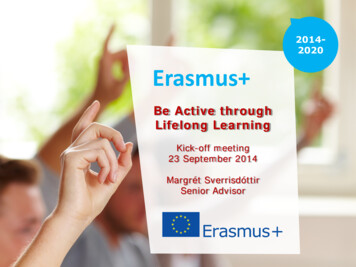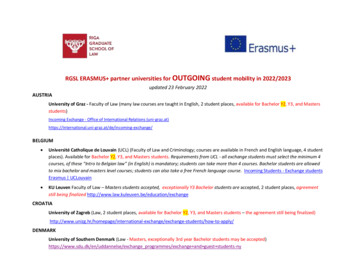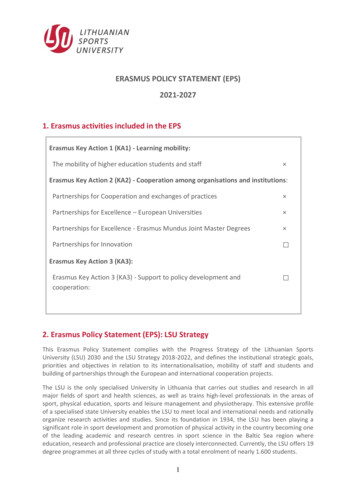
Transcription
ERASMUS POLICY STATEMENT (EPS)2021-20271. Erasmus activities included in the EPSErasmus Key Action 1 (KA1) - Learning mobility:The mobility of higher education students and staff Erasmus Key Action 2 (KA2) - Cooperation among organisations and institutions:Partnerships for Cooperation and exchanges of practices Partnerships for Excellence – European Universities Partnerships for Excellence - Erasmus Mundus Joint Master Degrees Partnerships for Innovation Erasmus Key Action 3 (KA3):Erasmus Key Action 3 (KA3) - Support to policy development andcooperation: 2. Erasmus Policy Statement (EPS): LSU StrategyThis Erasmus Policy Statement complies with the Progress Strategy of the Lithuanian SportsUniversity (LSU) 2030 and the LSU Strategy 2018-2022, and defines the institutional strategic goals,priorities and objectives in relation to its internationalisation, mobility of staff and students andbuilding of partnerships through the European and international cooperation projects.The LSU is the only specialised University in Lithuania that carries out studies and research in allmajor fields of sport and health sciences, as well as trains high-level professionals in the areas ofsport, physical education, sports and leisure management and physiotherapy. This extensive profileof a specialised state University enables the LSU to meet local and international needs and rationallyorganize research activities and studies. Since its foundation in 1934, the LSU has been playing asignificant role in sport development and promotion of physical activity in the country becoming oneof the leading academic and research centres in sport science in the Baltic Sea region whereeducation, research and professional practice are closely interconnected. Currently, the LSU offers 19degree programmes at all three cycles of study with a total enrolment of nearly 1.600 students.1
LSU internationalisation and modernisation strategyThe LSU vision is to develop into a University that promotes and ensures a wholesome and happy lifethrough sport and physical activity, bringing cultural, scientific and educational benefits and values ofsport, physical activity, recreation and health promotion to each individual with a primary focus onthe student. With its mission to promote sustainable development of physical, mental, emotionaland social well-being of people from different age groups, to help train high level athletes, andprovide up-to-date and relevant recommendations to different stakeholders on the development ofpolicies aimed at social and economic well-being through sport, physical activity, recreation andrehabilitation, the LSU considers internationalisation as one of the key factors that contributes to themodernisation of the University, involvement into the global world of research, enhancement ofquality and relevance of its education programmes and incorporation of modern technologies intoeducation and research. The LSU internationalisation policy is grounded on the two institutional corevalues, namely: inclusive accessibility and quality of academic services to national and foreignapplicants and students, and support of an active dialogue with national and foreign partners andstakeholders.In the LSU Progress Strategy 2030, internationalisation has been distinguished among the mainfactors that will help the University to implement its vision to become one of the leading institutionsin sports science, education and innovations in Europe, characterized by the quality of studies andresearch of international level, the application of innovations and new technologies, thecompetitiveness of its graduates in the global labour market, and the continuous development ofcompetencies and fostering of creativity in its academic staff.The participation in the Erasmus activities will contribute to the following strategic objectives:o To carry out internationally recognised high-level research and experimental development insport scienceo To conduct high-quality accessible, modern and research-based studieso To increase the international dimension and visibility of the Universityo To increase participation of the local community in sport and active leisureo To maintain leadership positions in providing high-quality training for sports specialists andrecommendations for different stakeholderso To ensure effective management of the UniversityRaising the overall quality of mobility experiences. Being an internationally oriented University, theLSU seeks to develop and maintain sustainable and long-term strategic partnerships with differentforeign higher education institutions and organisations that are distinguished by the highest qualitystandards in studies and research and whose achievements in sport and health sciences areinternationally recognised. In the framework of the Erasmus Programme, the LSU carries outmobility activities with over 90 partner higher education institutions involving students, graduates,and the academic and administrative staff. In the past decades the LSU has been increasing thenetwork of international partners to ensure wider opportunities for its students and staff to increasetheir professional knowledge, skills and competencies, to gain international and interculturalexperiences, and, overall, to raise the visibility of the University on a global scale. In the new phase ofthe Erasmus Programme (2021-2027), the LSU will seek to optimise the network of partners bringinga stronger focus on the quality of mobility experiences and, in particular, on the compatibility andquality of educational offers and the quality of student support services for inbound students.Geographically balanced network of partners. The geographical diversity of partner universitieswhich meet the interests of local students is another important factor to ensure wider possibilitiesfor academic experiences abroad. As a University representing the Baltic Sea Region, the LSU willcontinue to focus on mobility and cooperation activities with partner institutions from the Nordicand Baltic countries. Over the past years, the LSU has built intense cooperation in this region through2
mobility activities under the Erasmus Programme and cooperation projects under the regionalNorplus Programme. With the emergence of the Erasmus mobility scheme between the Programmeand with partner countries, the LSU has expanded its network of partners from the USA, Israel,China, Japan, Kazakhstan and other countries. In the new phase of the Erasmus Programme, the LSUwill continue to maintain and expand this collaboration out of bounds of the European EducationArea which enables to mutually benefit from the strengths of each institution in terms of quality anddiversity of educational practices, innovation in research, inter-cultural values and good governanceof the universities.Internationalisation of the curricula. The extent of courses offered in foreign languages has beensteadily increasing and the involvement of international students in the LSU activities has beenstrengthened and enlarged. Since 2013, the number of international degree students at LSU hasincreased four times. The LSU offers a number of international degree study programmes and part ofthem are run together with the international partners involving Erasmus mobility of students andstaff (European Bachelor in Physical Activity and Lifestyle, International Master in PerformanceAnalysis of Sport, and International Master in Basketball Coaching and Management). In cooperationwith the University of Tartu, the LSU implements joint doctoral studies that helped to increase themobility of researchers and PhD students, joint research publications in journals with high impactfactor, professional and linguistic competencies of teachers and researchers. In the upcoming years,the LSU is planning to continue the internationalisation of the curricula by reorganising certaindegree programmes into consortium-based or joint degree study programmes and developing newones.Capacity-building through international partnerships. In the past years, the LSU has significantlyincreased its participation in European cooperation projects, especially in the field of sport. The LSUadministrative units provide all the necessary support for the staff who coordinate or are involved aspartners in these projects. The expertise and experience gained from participation in the projectsenables the LSU to take a leading role in developing and implementing new projects. The LSU hastaken the first planning steps in bringing together higher education institutions in the area of sportscience across Europe for strategic partnership to build a strong network of European sportuniversities which will contribute to the international competitiveness of the universities involvedand enable their students to obtain a degree combining studies in several partner universities.The aim of such European University network would be to strengthen the quality of sport sciencestudies and research by building a platform for sharing human, intellectual and technologicalresources and provision of more integrated and structured learning opportunities for students withinthe network of partner institutions.The main foreseen activities of the network are (1) the creation of a long-term strategy for thenetwork setting out the principles and guidelines for more intensive cooperation with the aim toincrease the academic quality, and research-based contribution to the development of national andregional policies in sport and health sectors; (2) the creation and/or adaptation of joint master anddoctoral study programmes and courses which would enable partner institutions to offer moreflexible and innovative study programmes and teaching concepts for students; (3) sustainabledevelopment of the European sport culture promoting the historic heritage of national sports andgames, and thus to increasing intercultural competences of different academic and social groups; (4)mobilization of intellectual and technological resources through joint working groups to strengthenthe research and development potential and to increase the availability of resources (access todifferent databases, open use of research labs, inter-library network, search for external funding forjoint projects, etc.).3
3. Implementation of the Erasmus actionsThe LSU has been successfully implementing the mobility of students and staff in theframework of the Erasmus Programme since 1999 and over the years has establishedinternal regulations and procedures for the implementation of mobility activities which areconstantly monitored and, whenever necessary, updated. The LSU International RelationsOffice (IRO), consisting of three employees, is responsible for the coordination andadministration of the implementation process of the Erasmus Programme mobilityactivities and reporting for the implemented activities to the National Agency. The Erasmus inter-institutional agreements are concluded and renewed with foreign higher educationinstitutions according to the needs of the University's academic units and studyprogrammes.Before the mobility:LSU as the sending institution undertakes to: (1) disseminate information to all potentialcandidates on mobility opportunities, conditions and selection criteria in a transparent waythrough the set out channels of communication; (2) select students and staff for mobilityaccording to the selection criteria established at the University; (3) ensure properpreparation of selected participants for the mobility period, including their linguisticpreparation; (4) nominate the selected candidates to the receiving institution, set up theirstudy, traineeship, teaching or training plan and validate it by signing a learning/traineeshipagreement for students and mobility agreement for the staff members; (5) provideassistance to the mobile participant to prepare the documents required by the receivinginstitution in a timely manner and within the deadlines specified in the inter-institutionalagreement.LSU as the receiving institution undertakes to: (1) provide an up-to-date course cataloguecontaining the detailed information on the English-taught courses offered to mobilestudents and make it available online; (2) provide all relevant and necessary informationrelated to the student's mobility period (application procedure, academic calendar, gradingsystem, minimum English language proficiency, conditions for accommodation, healthinsurance, visa and temporary residence permit, support for persons with special needs,etc.); (3) upon receipt and evaluation of the application documents, issue a documentconfirming the acceptance of the mobile participant; (4) whenever needed, issue amediation letter and provide other assistance to the mobile participant for obtaining visathrough the responsible specialist at the Study Division; (5) provide the dormitory room orassist in finding suitable accommodation for the mobile participant; (6) in case of the staffmobility for teaching, integrate teaching topics agreed beforehand into the studyprogrammes.Selection of outgoing mobile participants: students. The candidates for the student mobilityfor studies and traineeships will be selected by centralised selection committees, consistingof International Relations Office (IRO) staff and study programme directors who selectcandidates based on the available places for mobility. The selection of candidates will becarried out according to the established procedure based on the following criteria: (1)academic performance; (2) motivation of the student identified through an interview; (3)linguistic proficiency; (4) compliance of the planned individual course units during themobility to their study programme; (5) student’s engagement in civic, research, and socialactivities.4
Selection of outgoing mobile participants: staff. The candidates for the staff mobility forteaching or training will be selected by centralised selection commissions according to theestablished procedure based on the following criteria: (1) prior agreements with the hostinstitution on the integration of teaching into a specific course (in case of teaching) /relevance of the training programme to the development of professional competencies ofthe staff member (in case of training); (2) proficiency in the language of teaching/training;and (3) content of the teaching/training programme. The priority will be given to(1) candidates whose teaching will be integrated into one of the consortium-based or jointstudy programmes (in case of teaching) / candidates applying for a staff training week eventorganized by the receiving institution (in case of training) (2) candidates who will participatein mobility activities for the first time or less (compared to other candidates) over the lasttwo years; (3) candidates who have initiated or contributed to the signing of an interinstitutional agreement with the host institution; (4) candidates who undertake toimplement additional activities during the mobility activity (development of new teachingmaterial, extension of inter-departmental cooperation activities, development of new orimplementation of existing cooperation projects, etc.).During the mobility:LSU as the sending institution undertakes to coordinate any changes that occur in the study /traineeship plan after the student arrives to the receiving institution by discussing them withthe responsible study programme director and validating them in the Learning/TraineeshipAgreement at the beginning of the study / traineeship period.LSU as the receiving institution undertakes to: (1) provide full support and help incomingstudents to integrate into the academic and social life (Orientation weeks at the beginning ofthe semester, the Erasmus Student Network (ESN) events, etc.); (2) seek to minimisechanges to the selected courses outlined in the learning agreement; (3) assign a studentmentor for each incoming student and a tutor to each incoming staff member who will takecare of the mobile participants during their mobility period; (4) ensure that all mobileparticipants have the same rights, opportunities and conditions as local students and staff;(5) provide the Lithuanian language learning opportunities to incoming mobile participants.The ESN LSU section that was opened in 2015, with the support of the IRO, coordinates andimplements the mentorship program based on one-to-one communication between astudent-mentor and an international student in order to make the adaptation period forincoming students much easier.After the mobility:LSU as the sending institution undertakes to: (1) give automatic recognition to the student'slearning outcomes upon their return from the mobility period; (2) help the student tointegrate into the study process after the mobility period; (3) ensure that the staff mobilityvisit for teaching/training is properly evaluated and recognized.LSU as the receiving institution undertakes to issue Transcript of Records and a documentconfirming the duration of mobility period (certificate of attendance) no later than fiveweeks after the mobility period.Student mobility for traineeships is organized applying the same regulations as for studentmobility for studies. The LSU undertakes to find a place for traineeship and communicatewith the organisation that accepts the student for the traineeship regarding the conditions5
to ensure the quality of traineeship experience. After the internship, the student gets aTraineeship Certificate signed by the supervisor of the internship.Participation in European and international cooperation projectsInternational development and integration into the European Higher Education Area and theEuropean Research Area, participation in the European and international cooperationprojects within the Erasmus Programme and the Nordic-Baltic Nordplus Programme as acoordinator and/or partner make a significant contribution to the quality and internationallevel in research and studies, development of innovations, enhancement of competitivenessfor its graduates in the European labour market, and the development of academiccommunity’s creativity. Through participation in the cooperation projects, the LSU seekssustainable development and long-term collaboration with different strategic academicinstitutions and different organisations who apply the highest standards to the academic andresearch quality and whose achievements in sports and health-related sectors have beeninternationally recognized. The LSU involvement in different European projects providesopportunities for students and staff to increase their general and professional knowledge,skills and competencies, to present the latest research findings, to gain international andintercultural experience, and bring greater international visibility for the university. Theknowledge triangle of research, education and innovation stands at the centre of theUniversity development. While participating in the cooperation projects, the LSU alwaysseeks to achieve that all knowledge and experience obtained through the project activities,outcomes and results are transferred and integrated into the learning and research contexts,helping to develop an interdisciplinary approach, expand research into new scientific areasand bring innovative practices to teaching and learning. Furthermore, participation in theEuropean, international and regional cooperation projects leads to the development of newjoint programmes, teaching and training methods, and integrated modules. Besides, theUniversity’s staff develops a high expertise in the fields of inclusion, intercultural awarenessand active citizenship and are better able to address the particular needs of students,including those with special needs or economically disadvantaged.Hence, the LSU participation in the Erasmus actions and integration into the EuropeanEducation Area make a significant contribution to achieving most of the objectives set out inthe LSU institutional strategy, in particular in the areas of research and studies.The past experience shows that the staff mobility for teaching and training have a strongimpact on the professional networking among the researchers which later leads to newcollaboration initiatives and projects in research. Over the past 10 years, the LSU has made asignificant breakthrough in different areas of sport and health sciences. During the externalassessment of the LSU research units, the international experts recognised the ongoingresearch in the area of biomedical sciences of an international level and the area of sporteducation to be of a strong national level. These achievements are strongly connected withtraineeships abroad of PhD students and incoming teaching visits of distinguished scholarswithin the Erasmus Programme (University of Tartu, Manchester Metropolitan University,Medical School Hamburg, Karolinska institute). Hence, the LSU will continue to strengthenthe quality of its PhD studies and research, taking advantage of the new opportunities thatare coming with the increased flexibility for PhD students (Short-term mobility for PhDstudents, blended mobility, etc.).6
The development of joint or consortium-based study programmes, incorporation ofstructured mobility activities, integration of incoming teachers into the curriculum have ledto significant improvement in the academic quality and integration of the latest researchfindings into study programmes. The presence of incoming mobile students and organisationof the International Weeks provide an ever-increasing international dimension to studiessince mobile students are integrated into study modules and carry out the groupassignments with local students. The LSU will continue in this trend in the next phase of theProgramme with the aim to expand the international dimension in studies and develop newconsortium-based or joint study programmes and modules in future.4. The envisaged impact of the participation in the Erasmus ProgrammeThe participation in the Erasmus Programme has been making an extremely significant impact onthe development of the LSU into the internationally oriented University in the past two decades. In1999, when the LSU joined the Erasmus Programme the mobility activities included only a fewoutgoing students and teachers; however, in a very short course of time with the help of the ErasmusProgramme the LSU has made a remarkable progress, increasing the number of the outgoing studentmobility to 60 persons per academic year and the outgoing staff mobility to 40 persons per academicyear. The development of the international studies at the LSU and the incoming flow of students andstaff were even more remarkable leading to the expansion of the international study modules anddegree programmes, and the rise of the incoming students to 50 persons per academic year and theincoming staff to over 35 persons per academic year.Another significant impact that the Erasmus Programme has made on the LSU internationalisation isthe growing number and geographical representation of partner institutions. The increasingparticipation in the Erasmus Programme and growth of the network of partner institutions promptedthe University to become involved into different European and international cooperation projects,including the Erasmus intensive programmes, thematic networks, capacity building projects,Erasmus Sport projects, etc.As stated in the LSU Strategy, one of the strategic objectives will be to increase the internationaldimension and visibility of the University and to become an even more internationally oriented andrecognised University. In the new phase of the Erasmus Programme 2021-2027, the LSU participationin the activities supported by the Programme (Key Actions 1 & 2) will be more integrated structurallyinto the curricula making it easier for students and staff to take advantage of the mobility andcooperation opportunities. The models for the integration of mobility that have been applied inseveral current study programmes will be further elaborated and transferred into other studyprogrammes. Within the next phase of the Programme, the LSU will continue to strive for the steadygrowth of the outbound students giving a special attention to ensuring the quality of their mobilityexperiences and increasing their traineeship opportunities.The LSU will seek to optimise the network of partner institutions by reviewing currently valid interinstitutional agreements with higher education institutions and to build the partnership network withorganisations which can offer high–quality traineeship placements in the areas of sport coaching,physical education, fitness, sports and leisure management and physiotherapy. Over the last fouracademic years, the LSU has reached the balance in the outbound and inbound mobility flows and inthe next phase of the Programme the LSU will seek to keep the mobility flows well balanced giving aspecial attention to increasing the geographical balance and diversity.7
LSU as the receiving institution undertakes to: (1) provide an up-to-date course catalogue containing the detailed information on the English-taught courses offered to mobile students and make it available online; (2) provide all relevant and necessary information

